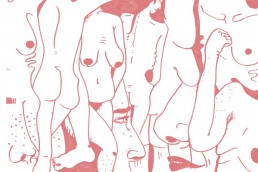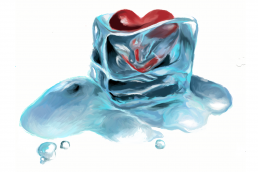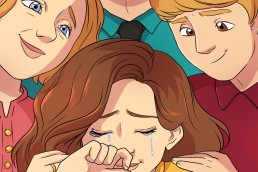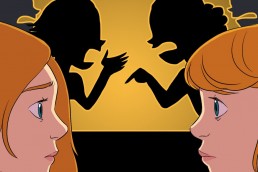by Kate Switzer
Image credit: Ida Henrich
Kate Switzer reflects on a battle with bulimia, and allowing herself to come home to her body
I spent my teenage years living out that dream in which you are behind the wheel of a car you have forgotten how to drive, and it’s rolling steadily towards an impact that you can’t avoid.
Bulimia had cut the strings that held my identity to my body. I would look at photos of myself, and wonder who that was wearing my clothes, hugging my friends, living me without me. I felt growing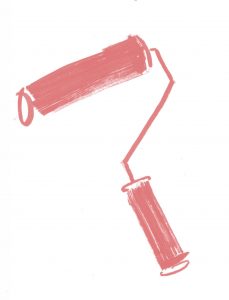 ly distant from my own reflection, in a way I find difficult to describe. My eating disorder was a desperate attempt to regain control of a body that I had forgotten how to inhabit. I ached for control. My “real body” I thought, was hidden from sight within this soft and weak girl’s form that I had not asked for.
ly distant from my own reflection, in a way I find difficult to describe. My eating disorder was a desperate attempt to regain control of a body that I had forgotten how to inhabit. I ached for control. My “real body” I thought, was hidden from sight within this soft and weak girl’s form that I had not asked for.
The feeling of not inhabiting reality rattled me. I had good friends, but cried with loneliness in class. I did well in school, but thought my ideas were idiotic. Bulimia eroded my esteem, my body, my teeth; I wanted to reveal perceived treasures under my skin, like an archaeologist brushing away dust at a dig. My fat was not my fat, I rejected it, and rejected my existence.
I finished school and started college, where I drank and drank and stole food from my housemates, and drank and purged and drunkenly danced, exuberantly, to burn more calories and reveal my bones. I still did not recognise myself, in club mirrors, in car windows, or in the mouths and glazed retinas of equally drunk dancing men, where I looked eagerly— often trying to glimpse a self that would be more palatable to me. All the time I was afraid to divulge my odd secret. I was not myself, I had refused this body, and was just staying here for a little while, waiting to move on to something better.
That night I sat on the edge of my childhood bed, and stared down the woman in the mirror, trying hard to know her. I saw the aggrieved eyes, but then the flecks of orange in the mud-brown irises. I saw the worry lines on her forehead, but then the single smiling dimple by her mouth.
It was not this internal contradiction that brought me to counselling, but the loss of my brother. My body had been empty for too long, so grief oozed in and filled the void like sticky tar. It took me more years to find a counsellor that could wade through it. She was a gentle but persistent confidante. Our sessions made me think of fishwives picking apart tangled nets at the end of a long day; we sorted through my sadness and guilt, and mended the breaches left by my secretive eating disorder. It was this careful mending that allowed me to admit to her that I was entirely alien to myself. She suggested that my unforgiving gaze blurred my own image; my self-judgements acted like a layer of grime on my reflection. I needed to soften that gaze, be kinder.
That night I sat on the edge of my childhood bed, and stared down the woman in the mirror, trying hard to know her. I saw the aggrieved eyes, but then the flecks of orange in the mud-brown irises. I saw the worry lines on her forehead, but then the single 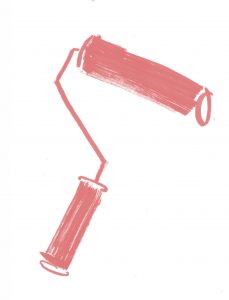 smiling dimple by her mouth. I took off this woman’s clothes and studied with reluctance her much-maligned tummy, and those thick athletic legs, then the strong arms and prominent collarbone with it’s old, knotted fracture. I looked back to my face, my face, my full and curving lips, my speckled nose and those unruly expressive eyebrows I inherited from my father. I ran my hands over my skin, following the route of my fingertips in the mirror, concentrating on both seeing and feeling; I wanted to see and feel this touch and know, finally, without doubt, that this was the body, heart and lungs, that I had lived in for 25 years.
smiling dimple by her mouth. I took off this woman’s clothes and studied with reluctance her much-maligned tummy, and those thick athletic legs, then the strong arms and prominent collarbone with it’s old, knotted fracture. I looked back to my face, my face, my full and curving lips, my speckled nose and those unruly expressive eyebrows I inherited from my father. I ran my hands over my skin, following the route of my fingertips in the mirror, concentrating on both seeing and feeling; I wanted to see and feel this touch and know, finally, without doubt, that this was the body, heart and lungs, that I had lived in for 25 years.
It was not easy to come home to a body that I had hurt for so long. It was a hesitant love story, a will-they-won’t-they kind of romance: we drank and fought and fooled around. My body responded to nurturing by relinquishing a lot of the old aching tension and allowing me to deal with my grief.
To make a house a home, one learns to look beneath the surface, to enjoy knowing little quirks like which floorboards creak and exactly how to twist the key to release the front door. I’m trying to inhabit my body fully now, to accept its creaky floorboards and to enjoy its strength. I am home and I love it here.

